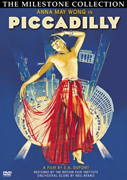 Though they’ve understandably slipped out of the spotlight, silent movies still inspire fascination and devotion among cineastes and good old-fashioned movie buffs. Turner Classic Movies devotes the midnight timeslot to silents every Sunday night, and museums and revival houses across the country still screen silent classics, often with live accompaniment by pianists and small musical combos.
Though they’ve understandably slipped out of the spotlight, silent movies still inspire fascination and devotion among cineastes and good old-fashioned movie buffs. Turner Classic Movies devotes the midnight timeslot to silents every Sunday night, and museums and revival houses across the country still screen silent classics, often with live accompaniment by pianists and small musical combos.
We’re convinced that one of the reasons Ms. Cladrite fell for us was the eight consecutive Mondays we spent laughing our heads off during a Buster Keaton festival at New York’s Film Forum. There’s nothing like seeing a great silent movie in packed house with adept accompaniment provided by a deft pianist (Steve Sterner, in this case).
 There was little in the way of film criticism in the silent era, so to a large degree it fell to later critics and film scholars to keep alive the discussion and scholarship surrounding these movies. One of the key figures in silents criticism was H.A.V. Bulleid, an English writer who was still with us until about ten months ago.
There was little in the way of film criticism in the silent era, so to a large degree it fell to later critics and film scholars to keep alive the discussion and scholarship surrounding these movies. One of the key figures in silents criticism was H.A.V. Bulleid, an English writer who was still with us until about ten months ago.
Bulleid’s key work of film criticism, Famous Library Films, never saw the light of day (or, rather, the ink of print). Comprising reviews of silent movies written in the early 1940s for Amateur Cine World, Famous Library Films was to be published in book form in 1947, but the publisher fell prey to the still-struggling postwar economy in England, and Bulleid was forced to shelve the project.
 But finally, more than sixty years later, Bulleid’s not-quite-forgotten collection is finally being made available to the public, free of charge, at SilentsAreGolden.com. Included is a previously unpublished preface written for the book’s planned 1947 edition by director Fritz Lang and a contemporary introduction provided by esteemed silent film scholar Kevin Brownlow.
But finally, more than sixty years later, Bulleid’s not-quite-forgotten collection is finally being made available to the public, free of charge, at SilentsAreGolden.com. Included is a previously unpublished preface written for the book’s planned 1947 edition by director Fritz Lang and a contemporary introduction provided by esteemed silent film scholar Kevin Brownlow.
Among the twenty-three pictures Bulleid critiques in the book are Sergei Eisenstein‘s Battleship Potemkin, the German Expressionist classic The Cabinet of Dr. Caligari, Piccadilly starring Anna May Wong, Lang’s own Metropolis (too bad Bulleid didn’t live long enough to see the recent restoration of this classic), and F. W. Murnau‘s Faust.
